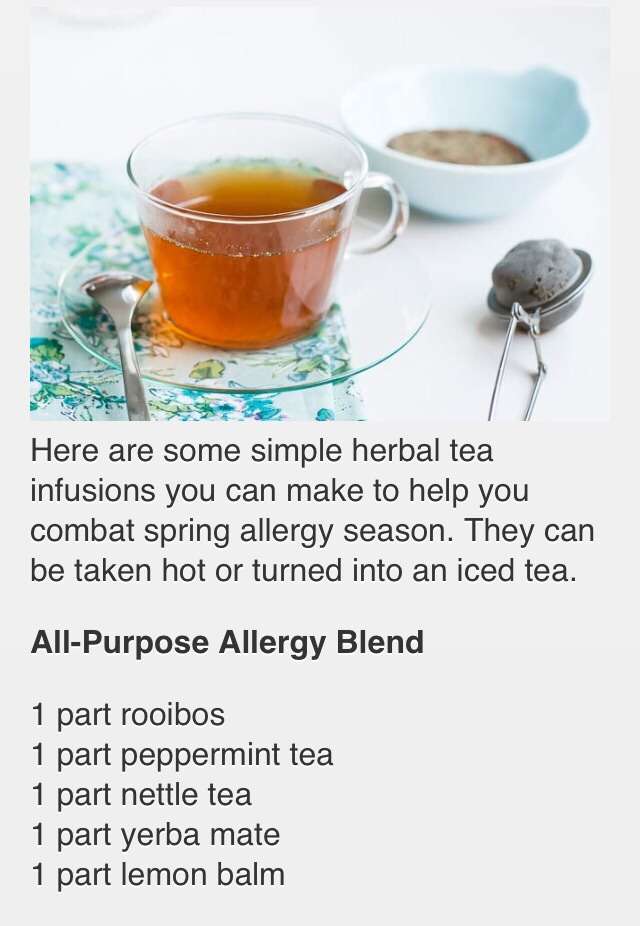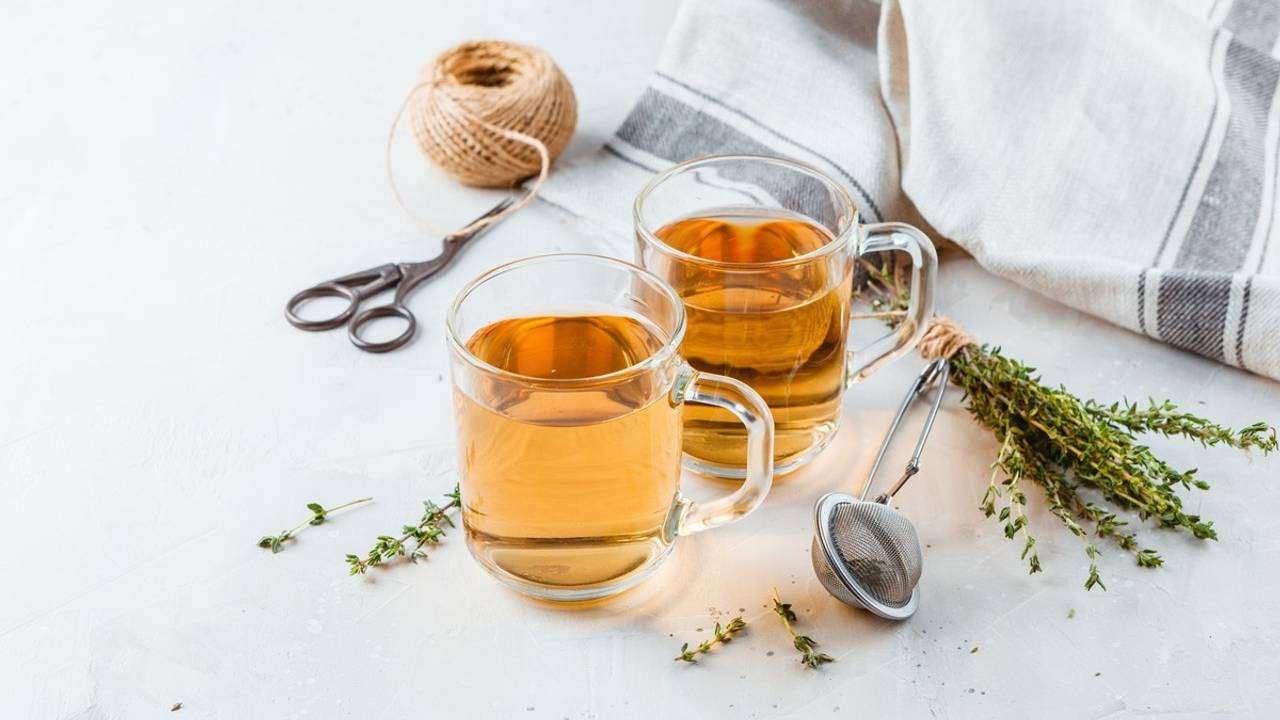Green Tea May Fight Allergies
- Date:
- American Chemical Society
- Summary:
- Allergy sufferers may want to add green tea to their sniffle-fighting arsenal. New evidence suggests that drinking the popular brew may provide some relief.
Allergy sufferers may want to add green tea to their sniffle-fighting arsenal. New evidence suggests that drinking the popular brew may provide some relief. Researchers in Japan identified a compound in green tea that, in laboratory tests, blocks a key cell receptor involved in producing an allergic response. The compound, methylated epigallocatechin gallate , may have a similar effect in humans, they say. Their study will be described in the Oct. 9 print issue of the Journal of Agricultural and Food Chemistry, a peer-reviewed publication of the American Chemical Society, the world’s largest scientific society.
Although similar compounds in green tea have previously been shown to be anti-allergenic, this particular compound appears to be the most potent, the researchers say.
“Green tea appears to be a promising source for effective anti-allergenic agents,” says Hirofumi Tachibana, the study’s chief investigator and an associate professor of chemistry at Kyushu University in Fukuoka, Japan. “If you have allergies, you should consider drinking it.”
Previous studies have shown that EGCG fights allergic reactions in rodents that were given the compound orally, but researchers are just beginning to understand how it might work.
Story Source:
Are There Different Types Of Tea Allergies
Teas are categorized as either herbal or nonherbal. You may be allergic or sensitive to components found in either or both types.
If you have an allergy to any component found in tea, you should avoid it completely. If you have a sensitivity to these compounds, you may be able to tolerate them in small amounts, particularly if your tea is only lightly brewed.
What Is Nettleand How Does It Help With Allergy Symptoms
For centuries, people have used nettle to treat allergies.
The herbaceous flowering plant, also known as Urtica dioica or stinging nettle, is found all over the world, though it was once localized to Europe, Asia, and parts of North Africa.
Covered in delicate white flowers and tiny hairs, nettles look pretty darn innocent. But dont let their daintiness fool you: They sting.
Read more: What Is Nettle and What Does It Taste Like?
The sharp hairs act as hypodermic needles, injecting histamine into the unlucky person who touches them. Though typically relatively harmless to humans, this can produce a painful sensation at the site of contact. Burning, itchiness, and redness caused by touching nettle will usually subside after a few hours or with the use of antihistamine creams, like Benadryl.
But waithow can a tea made from something that causes skin irritation be used to treat allergies? Well scientists arent sure.
Most experts think that more evidence is needed to prove nettles effectiveness against seasonal allergies. A study from 2017 found that nettle extract and a placebo reduced symptom severity in comparable ways.
I have been able to stop taking my allergy medicine by having a cup of this delicious Nettle tea each morning. It has been a lifesaver for the past two years, raved one reviewer.
One nettle believer wrote about her experience with the tea for MindBodyGreen.
Don’t Miss: What Is The Teas Test For Lpn
Do Tea Drinking Habits Help Allergies
The onset of allergy season means an onslaught of sniffly noses, headaches, and itchy eyes. Fighting back against allergy symptoms can be exhausting. Fortunately, establishing healthy habits can do a lot to protect our bodies against seasonal allergies. Recent studies suggest that drinking tea regularly helps individuals build up a steady defense against pesky allergens. A single hot cup of tea, while soothing, isnt going to immediately wipe out all of your allergy symptoms at once but the evidence suggests that drinking tea daily significantly reduces those symptoms. Many teas supply antioxidants and serve as natural anti-inflammatories, which helps ease congestion and revitalizes the body. Looking for relief from your allergy-related woes this season? Read below to find a list of teas that provide you with some extra support:
Seasonal Allergy Causes And Symptoms

Seasonal allergiesalso called hay fever or allergic rhinitisare caused by your immune systems overreaction to outdoor allergens . Typically, this happens after exposure to certain trees, grasses, and weeds.
Signs of seasonal allergies include:
- Itchy eyes
- Fatigue
Because of these irritating symptoms, allergic rhinitis is often confused with the common cold.
Of course, severe and persistent allergies warrant a trip to the doctor. Best case scenario: They can prescribe you medications that will treat your condition quickly and effectively. Worst case scenario: They discover an underlying illness thats causing your symptoms. Either way, youll be better off for having seen the doc.
Just to be clear, were offering this advice as a possible treatment for mild seasonal allergies. If you suspect you have something deeper going on, please see a doctor. Do not try to treat possibly infectious or dangerous diseases with tea.
If your symptoms are mild, though, or if you favor holistic treatments , a cup of herbal tea could be in order.
Don’t Miss: What Is The Best Tea For Lowering Blood Pressure
What Is An Allergy
An allergy is an immune response to allergens entering the body creating a histamine response. These can be environmental or they can be gut-related causing overactive responses from the immune system.
This usually results from poor digestive health that clogs up the lymph in the digestive tract. 80% of our immune system and lymphatic system is located in the intestinal system. So it would make sense that there are beneficial herbs we can eat that can help alleviate some of these symptoms.
Symptoms Of A Tea Allergy
Some people are allergic to tea. Two of the most common tea allergies are to chamomile tea and linden tea 1. A tea allergy is a bad reaction of the bodys immune system. It is a food allergy 1. Some people are so allergic to tea that they go into anaphylactic shock, which is when a persons throat completely swells up and he cannot breathe. This is extremely rare, but if does happen to you, go to the hospital immediately. Most symptoms are not dangerous, and they clear up within a couple of days.
Also Check: Is Mullein Tea Good For Copd
What Kind Of Teas Are Good For Allergies
Many teas may help relieve the symptoms of seasonal allergies. All Camellia sinensis teas and many herbal infusions may provide a strong anti inflammatory and antioxidant activity. Both may be helpful, because boosting immune system may help reduce the risk or severity to hay fever. However, when trying to find the best tea, those with antihistamine activity may be the best choice. To get the best benefits, how you drink your tea is important too. Single cup of tea may not be enough, but regular drinking habit may be able to help you forget about allergies altogether. For tea to help, its advisable to drink it daily over at least several weeks.
So, what are the best real and herbal teas for allergies?
Teas And Herbal Teas To Survive The Allergy Season
Whether its called seasonal allergies, allergic rhinitis or hay fever, immune reactions affect almost a quarter of the Canadian population during the allergy season, between April and August. Many people turn to antihistamines sold in pharmacies to relieve their symptoms. However, there is an effective, natural and delicious solution to fight these reactions in your kitchen.
Here are 8 types of teas and herbal teas to help you with the allergy season !
Read Also: Where To Buy Butterfly Pea Tea
Teas To Sip During Allergy Season
Dr. Cole says that several herbal teas in particular can be great additions to your daily self-care regimen if you suffer from allergies. He likes turmeric, ginger, and nettle teas, which he says can soothe any inflammation occurring in the sinuses that can contribute to pressure, congestion, runny nose, and other seasonal allergy symptoms.
“I also recommend echinacea and eucalyptus, which can be game-changers for clearing up congestion and are full of antibacterial properties,” Dr. Cole says. “But one of my all time favorite teas for allergies specifically is rooibos tea, as it is packed with the antioxidant quercetin that has been shown in studies to help block the histamine response that occurs in seasonal allergies.”
Dr. Chimileski also likes hyssop, which she says can soothe post nasal drip-related issues in the throat while also draining the sinuses and notes that rosehip tea offers a great source of vitamin C to help modulate the allergic response happening throughout the body. And those who suffer from itchy, watery eyes may benefit from chamomile tea, which has been shown to help calm the nervous system and promote restful sleep. She suggests drinking tea year round and adding in local honey a few months before allergy season kicks in to help prevent your symptoms from being so intense.
Tea For Allergy Season
With the approach of allergy season, many reach for over the counter medication for relief from sinus aches, runny nose, and itchy eyes. However, relief can be found in a good cup of herbal tea.
There are certain herbs that provide natural antihistamine benefits in addition to other anti-inflammatory effects. In addition, herbal tea is an excellent way to stay hydrated and fill up on antioxidants.
Don’t Miss: Where To Buy Tea Party Hats
Allergy Tea: Congestion Tea
All of that sneezing, wheezing, nose-blowing and eye-watering suggests at least two things: the person engaging in the dramatic purging is allergic to pollen and the allergy is precipitating the build-up of fluids within the body. In short, the victim is awfully congested.
Weve got a tea for that, aptly named Congestion Tea.
The natural world offers allergy sufferers a wealth of botanical compounds that help get them through the day and achieve restful sleeps. One of the most powerful is eucalyptus. While the allergy section of the market will offer eucalyptus oils, which people use to clear congestion, our Congestion Tea incorporates leaves from the eucalyptus tree, which is native to Australia but now grown around the world. Did you know that eucalyptus leaves comprise the entirety of the diets of koalas?
Eucalyptus improves the lives of allergy sufferers by opening up the sinus and lungs, which improves circulation. It also works as an expectorant meaning it encourages the release of the gunk clogging our chests and nasal passages and has strong anti-inflammatory properties.
Our Congestion Tea also includes Elderflower, a well-known allergy-symptom-fighting plant medicine. Like eucalyptus, it is commonly found on store shelves, alongside OTC pills and elixirs.
Between eucalyptus and elderflower, our Congestion Tea is custom-blended for your allergy-related needs.
Hay Fever Antihistamines Herbal Teas And Me

I first became interested in the use of herbal teas for allergy relief some years ago because I found that over-the-counter antihistamines for my hay fever were either making me drowsy or giving me headaches or nausea.
In short, these products worked to treat my streaming eyes and runny nosebut made me feel either ‘wiped out’ or ‘under-par’.
I decided to research whether I could relieve my symptoms in a more natural way, without these side effects. Now, I regularly take ginger or lemon balm tea, sweetened with a little locally produced, raw honey .
I hope you will enjoy reading my article, in which I explain a little about different types of tea, my method of preparation, and the equipment I use to prepare my tea. If you would like to read further yourself, you can find a list of useful resources used in my research at the bottom of the page.
You May Like: Is Tea Good For Acid Reflux
So What Can You Do For Seasonal Allergies
Many people turn to over-the-counter antihistamines, but not everyone wants to rely on prescriptions to save the day.
Did you know there is a natural way of aiding seasonal allergies?!
Drinking tea!!!
Several herbal teas contain natural properties that help relieve seasonal allergies. Lets take a look at some of the best teas for seasonal allergies to help prevent you from sneezing your way through the summer.
If you suffer from hayfever
Green Tea For Allergies: What Does The Science Say
For as long as people have suffered from allergies, they have been looking for ways to alleviate the symptoms of them. In recent years, green tea for allergies has caught on because of a study published in 2002. That study suggested that one of green teas main antioxidants, EGCG, could help fight allergy symptoms. But does drinking a cup of tea really have the potential to help relieve your allergies?
You May Like: What Tea Is Good For Kidneys
Allergic To Herbal Tea
Whilst the teas mentioned above are safe and effective, as with all things, there is always going to be someone who has an adverse reaction to some herbal teas.
One of the chief culprits is Chamomile tea and if you suffer from hay fever, although this tea is usually a very calming and soothing one, it might be one to avoid as it is a close relative of ragweed, the pollen of which is responsible for causing hay fever in many individuals.
Buying ready-made herbal teas, either loose or as tea bags will be helpful as the ingredients list will give you a warning of any likely allergic reactions and any contraindications such as medication interactions, etc.
Allergy Tea: Organic Sunrise Chai
Heres another tea that simultaneously helps contain allergic reactions while stimulating taste buds. Cant say that about Benadryl!
This warm, spicy chai thrills with its exotic, pungent flavor. It contains classic chai spices, like ginger, cinnamon, fennel and clove, as well as cayenne pepper. But the key ingredient in Organic Sunrise Chai for allergy relief is turmeric.
Turmeric contains a bounty of a powerful compound called curcumin the substance is so beneficial that it often is extracted from turmeric and sold on its own, in supplements and powders. Research into the health properties of curcumin is wide-ranging, and it includes allergies. Studies show it can significantly reduce and inhibit allergic responses. One study published by the American College of Allergy, Asthma & Immunology demonstrated that allergy sufferers taking curcumin experienced diminished allergy symptoms, like sneezing and congestion, compared to those who took placebos.
Read Also: What Is The Best Hot Tea To Drink
How To Steep Tea
Herbal teas for allergies are most effective when steeped into a long and strong infusion and taken over time.
- For hot infusions: Steep 1-3 tablespoons of herb 8 oz of hot boiling water for 15 minutes to 1 hour.
- For cold infusions: steep 1 oz of herb to 1 quart of water overnight with a lid on the counter or in the fridge.
Grab our free tea steeping cheat sheets and never wonder if youre steeping your cup of tea the right way again!
Where To Buy Allergy Tea Blends
The best allergy tea blends are the ones that are made custom for your taste preferences as well as for your individual bodys needs.
We have a free tea blending course that will teach you how to blend your own tea here!
We also have a fantastic allergy-fighting tea recipe that we love and use this time of year. You can start with this recipe and adapt it to your liking.
We also have teas with the helpful herbs listed above in our Farmhouse Teas store:
Also Check: Sheamoisture Olive & Green Tea Shea Butter Soap
Teas To Help With Allergy Season
- 0 comments
- Post by Katie Panara Apr 05, 2022
Good morning, sweet tea sippers! I hope that you all had a wonderful weekend and have been enjoying the slow rise in temperatures that we have been experiencing! Speaking of warming temperatures, something that inevitably comes with the changing of seasons proves seasonal allergies. You know what I’m talking about. As the temperatures start to warm and the flowers begin to pop out of the ground, we start to feel some of that post nasal drip, sneezing ensues, and you start to spend a bit more on tissues than normal. Because these symptoms are hard to avoid and because I have been experiencing them myself, I thought a great tea topic to discuss today would be some of our teas to help alleviate the burden that comes along with the seasonal allergies. Check out my recommendations below!
“Best Tea I Have Ever Had!!!
Best Tea For Seasonal Allergies

The common symptoms of seasonal allergies are sneezing, a stuffy or runny nose, watery or itchy eyes, headaches, fatigue, and a sore throat. Allergy season ranges from spring and summer to fall, but depending on which types of pollen affect you, it can sometimes feel like these irritating symptoms are never ending. If youre looking to naturally alleviate the uncomfortable symptoms and side effects of your seasonal allergies, try a powerful herbal remedy tea! Certain fresh or dried herbs in tea act as natural treatments to seasonal allergies, so drinking tea for allergies can be a tasty and effective way to find relief.
Sips by is a personalized tea discovery subscription. Each month, we match tea drinkers across the U.S. with delicious teas from over 150 global tea brands that were sure theyll love. Members receive 4 teas chosen just for them in every box. Learn more about our tea subscription service.
Recommended Reading: Is Iced Tea Bad For Kidney Stones